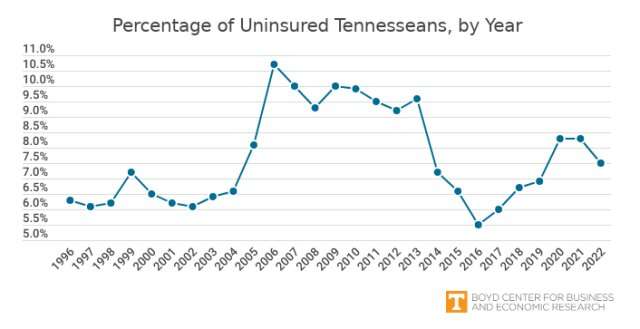
The uninsured rate for children in Tennessee declined for the second straight year to just 2.3% for 2022—the lowest reported percentage since 2018, according to a new study by the Boyd Center for Business and Economic Research at the University of Tennessee, Knoxville.
The Impact of TennCare: A Survey of Recipients, 2022 also shows that the overall percentage of uninsured Tennesseans is trending toward pre-pandemic levels, falling to 7.5% for 2022. This decrease represents more than 42,000 people who have gained heath care coverage since 2021. The uninsured rate for adults dropped from 9.9% in 2021 to 9% this year.
Among TennCare recipients, 95% indicated that they are happy with the program’s quality of care, marking the 14th straight year in which satisfaction with TennCare exceeded 90%. Survey participants also indicated that they are happy with the care their children received: 85% of all heads of household and 83% of TennCare heads of household reported excellent or good care.
“The continued high satisfaction rate from our TennCare members reflects the strong partnership with our TennCare providers and our shared commitment to improve lives through high-quality cost-effective care,” said TennCare director Stephen Smith.
Professor of Accounting LeAnn Luna and Boyd Center Senior Research Associate Emily Pratt coauthored the study, which examines the health coverage status of Tennessee residents, the use of medical facilities and satisfaction with medical services received based on a telephone and online survey of approximately 5,000 households conducted between May and July 2022.
Approximately 62% of TennCare heads of household reported being able to see a doctor within a week of requesting an appointment. Affordability continues to be the most commonly cited reason for failing to obtain health insurance in 2022, with 88% of respondents listing it as a major or minor reason that some Tennesseans do not obtain coverage.
The number of survey respondents indicating that COVID-19 affected their quality of care continued to decrease, falling from 20.8% in 2021 to 18.7% this year. In 2021, 12.6% reported they had been unable to see a physician because the office was closed for nonemergency visits due to COVID-19, but in 2022 that number dropped to just 1.6%. Only 1.3% of respondents reported that they had been unable to make an appointment for their child due to COVID-19 restrictions.
Source: Read Full Article
